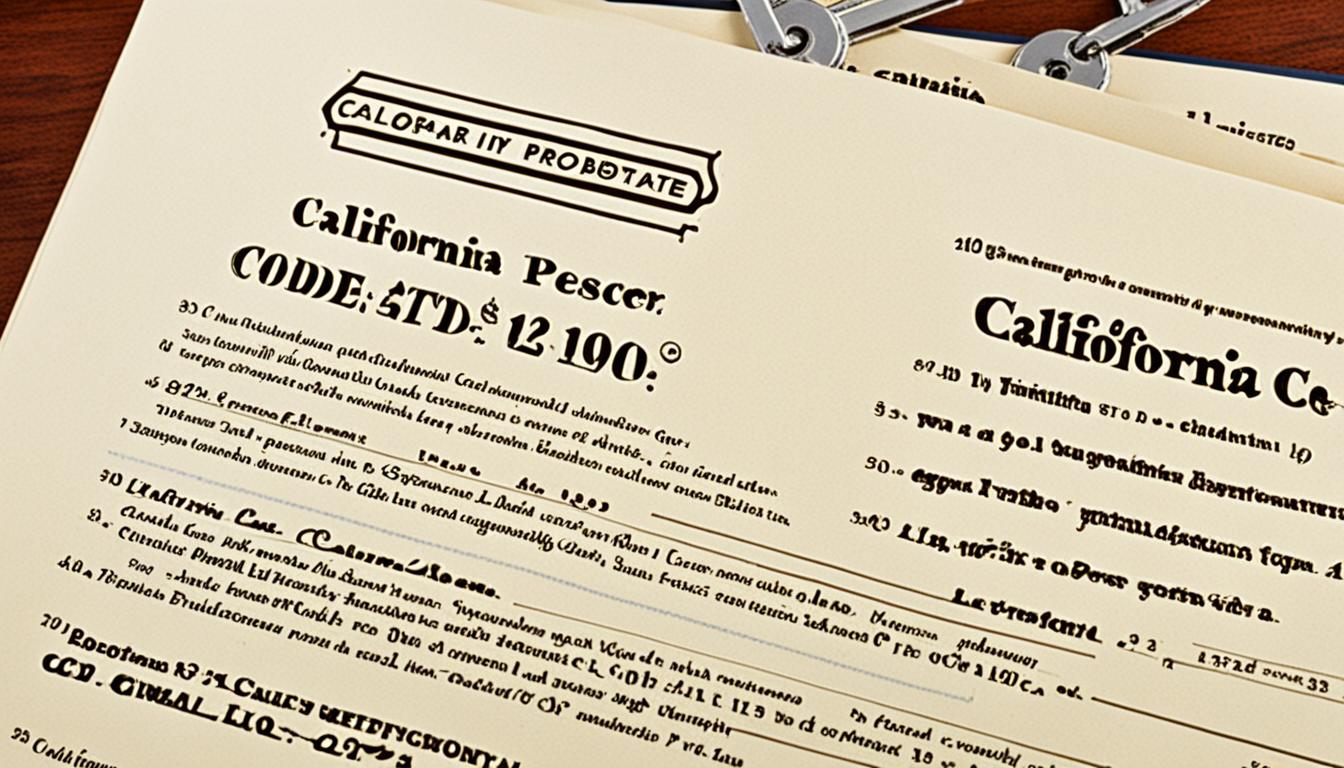The California Probate Code Sections 810-813 help us understand mental capacity in legal matters. This includes inheritance, trust management, estate planning, and sharing assets. They say most people can make decisions and be responsible for their actions. But, they also list mental issues that might affect someone’s ability to make choices.
A diagnosis of a mental or physical issue doesn’t automatically mean someone can’t make decisions. The real test is if they can understand, value, and share the details and outcomes of a decision or legal action. This way, legal duties and the rights of everyone involved are looked after.
Knowing the details of the California Probate Code Sections 810-813 helps people and lawyers. It makes going through probate, planning estates, and sharing assets smoother. It also makes sure everyone follows the law and gets the best outcome.
Overview of California Probate Code Section 810-813
The California Probate Code Sections 810-813 set rules for checking if someone can make decisions. They help protect people’s rights and keep legal processes fair.
Section 810 says most people can make their own choices and take responsibility for their actions. But, people with mental or physical issues might still be able to make legal decisions. This includes things like signing contracts, getting married, making health choices, or making wills and trusts.
Sections 811-813 list what mental issues might affect someone’s ability to decide. They look at things like alertness and attention, information processing, thought processes, and managing feelings. These rules are key in deciding if someone can give informed consent for medical treatments.
| Key Provisions of California Probate Code Sections 810-813 |
|---|
|
These sections are important for protecting people’s rights to make choices. They are especially important for decisions about estates and health care.
Rebuttable Presumption of Mental Capacity
Section 810 of the California Probate Code says most people can make decisions and be responsible for their actions. This rule is true even for those with mental or physical disorders. It shows that people with disorders can still make legal decisions, like getting married or making medical choices.
Persons with Mental or Physical Disorders
A diagnosis of mental illness or defect doesn’t mean someone can’t make a decision. Each decision is judged on its own. This means a person can be good at some decisions but not others.
Evidence of Mental Function Deficits
To decide if someone can’t make decisions, courts look at evidence of specific mental function deficits. They check for problems in alertness, attention, and other mental skills. This helps figure out if someone can’t handle certain decisions.
To say someone can’t make decisions, they must really struggle with understanding the outcomes of their actions. Courts need strong evidence to show that a guardian is needed to protect the person’s interests.
“The evaluation of substantial inability is based on deficits in certain mental functions, with specific assessments in areas like alertness, attention, information processing, thought processes, and mood regulation.”
Mental Function Deficits and Legal Capacity
California’s Probate Code talks about the mental issues that affect a person’s legal capacity. These issues include problems with alertness and attention, like being awake, knowing where you are, and focusing. They also include problems with information processing, like remembering things, talking, recognizing people, and thinking logically.
Other issues are problems with thought processes, like disorganized thinking, seeing or hearing things that aren’t there, believing strange things, and having unwanted thoughts. And, there are problems with ability to modulate mood and affect, like feeling the wrong emotions for too long.
To be seen as not having capacity, a person must have a big mental issue. This issue must make it hard for them to understand and think about the effects of their choices or actions. This is key in deciding if someone can handle legal and financial matters.
Alertness and Attention
Not being able to stay alert and focused can really affect a person’s choices. Things like how awake you are, knowing where you are, and being able to pay attention are important. They help figure out if someone can make good decisions.
Information Processing
How well someone can process information is key to their legal capacity. This includes things like memory, talking, recognizing people, and logical thinking. If these are impaired, it can make it hard for someone to understand and make choices.
Thought Processes
Having disorganized thoughts, seeing or hearing things that aren’t there, believing strange things, and having unwanted thoughts can mess with a person’s decision-making. It’s important to check how someone’s thoughts are to see if they can make good choices.
Ability to Modulate Mood and Affect
Feeling the wrong emotions for a long time can also affect someone’s legal capacity. Being able to control your feelings is important for making good decisions.
“Relevant mental functions that significantly impair the ability to understand and appreciate consequences are assessed, including alertness, attention, information processing, and thought processes.”
Determining Capacity for Specific Acts
The California Probate Code, Section 812, sets the rules for knowing if someone can make certain decisions or do certain acts. This covers things like making contracts, selling property, getting married, and making wills or trusts.
To make a decision, a person must:
- Communicate their choice
- Know and understand their rights, duties, and responsibilities
- Know the likely outcomes for themselves and others
- Know the risks, benefits, and other options
This law shows the need to check if someone can make certain decisions. It says an individual’s ability to make legal decisions can change with the task’s complexity.
Assessing Capacity for Specific Acts
To see if someone can do a specific act, courts look at their mental skills, such as:
- Being alert and paying attention
- Processing information
- Thinking clearly
- Managing their mood
This helps figure out if someone can understand their rights, duties, and the outcomes of their actions.
“The goal is to let lawyers help clients who are not fully able and protect their rights.”
By checking capacity for specific acts, the legal system helps people with mental or physical issues make informed choices. It also protects them from the bad effects of poor legal decision-making.
Requirements for Informed Consent in Medical Treatment
In California, the rules for giving informed consent in medical treatment are clear. They are found in Sections 810-813 of the Probate Code. These rules say who can give valid consent for medical treatments.
To give informed consent, a patient must understand the treatment and its risks. They must be able to make smart choices and know about their illness and treatment options. They also need to know the benefits and risks of the treatment and any other choices they have.
The goal of informed consent is to help patients make smart choices about their health. Before starting treatment, doctors must get consent from the patient or their guardian. This consent must be kept in the patient’s medical records.
| Criteria for Informed Consent | Description |
|---|---|
| Understanding of information | The patient must be able to comprehend the nature and seriousness of their condition, the recommended treatment, and the potential benefits and risks. |
| Rational decision-making | The patient must be able to participate in the treatment decision through a logical, thoughtful process. |
| Ability to communicate preferences | The patient must be able to respond knowingly and intelligently to queries about the treatment and express their healthcare preferences. |
California’s Probate Code sets these rules to protect patients’ rights. It makes sure patients have a say in their medical care.
california probate code – section 810-813
Sections 810-813 of the California Probate Code help with checking if someone can make decisions. This includes decisions about contracts, wills, and medical treatments. These sections say most people can make their own choices unless proven otherwise.
They also list mental issues that might affect someone’s ability to decide. And they explain how doctors should get permission before treating someone.
The code wants to protect people’s rights and make sure they can make their own choices. It looks at if someone can understand, think about, and share important info. This way, it’s not just about having a mental illness.
Some key points from the California Probate Code Sections 810-813 include:
- Every individual is presumed to have the capacity to make their own decisions unless proven otherwise.
- Certain mental impairments, such as anxiety or depression, may not necessarily render an individual legally incapacitated.
- The standard for executing a will, codicil, or uncomplicated trust is outlined in Probate Code section 6100.5, which specifies the requirements for testamentary capacity.
- The court may consider various mental functions that significantly impair a person’s ability to understand and appreciate the consequences of their testamentary decisions, including alertness, information processing, and thought processes.
- Challenges to trust validity for lack of capacity must be made within 120 days of the trustee’s notification or 60 days from the delivery of trust terms, while will contests can be initiated immediately.
Understanding the California Probate Code Sections 810-813 helps people and families with estate planning. It makes sure their rights and wishes are looked after.
| Key Provisions | Details |
|---|---|
| Rebuttable Presumption of Capacity | Every individual is presumed to have the capacity to make their own decisions unless proven otherwise. |
| Testamentary Capacity | The standard for executing a will, codicil, or uncomplicated trust is outlined in Probate Code section 6100.5, which specifies the requirements for testamentary capacity. |
| Evaluation of Mental Functions | The court may consider various mental functions that significantly impair a person’s ability to understand and appreciate the consequences of their testamentary decisions, including alertness, information processing, and thought processes. |
| Challenges to Trust Validity | Challenges to trust validity for lack of capacity must be made within 120 days of the trustee’s notification or 60 days from the delivery of trust terms. |
| Will Contests | Will contests can be initiated immediately, but once probate is opened, challengers only have 120 days to file a contest. |
The California Probate Code Sections 810-813 focus on a person’s ability to make choices. They don’t just look at medical diagnoses. This way, they balance protecting rights with making sure probate and estate planning are done right.

Capacity for Decision-Making and Understanding Consequences
Under Section 812 of the California Probate Code, a person must have certain abilities to make legal decisions. They need to communicate their choices, understand their rights and duties, and know the likely outcomes for themselves and others. They must also see the big risks, benefits, and other choices.
Rights, Duties, and Responsibilities
The law looks at how well someone can make decisions, not just their mental or physical health. People with mental or physical issues might still make some decisions if they know their rights and duties.
Probable Consequences
When checking if someone can make decisions, we look at if they can see the likely effects of their choices. They must think about how their choices affect them and others. This means they should be able to predict and think over the outcomes of their decisions.
Risks, Benefits, and Alternatives
A person must also understand the big risks, benefits, and other choices in their decisions. This makes sure they’re making informed choices, looking at all the options and their effects.
The California Probate Code focuses on these abilities to protect people’s rights and freedom. It makes sure big decisions are made with a clear view of the outcomes.
“The law emphasizes that the focus should be on the individual’s specific decision-making abilities, rather than on a general diagnosis or presumption of incapacity.”
Testamentary Capacity for Wills and Trusts
In estate planning, testamentary capacity is key. The California Probate Code sets a low standard for it. This means you need to be able to make a will or trust, but not as much as for other big decisions.
Section 6100.5 of the Probate Code explains what you need for testamentary capacity. You must understand what making a will or trust means. You also need to know about your property and your family. Or, if you have mental issues that affect your decisions, you might not have it.
Mental health issues like depression or anxiety don’t always mean you can’t make a will. The focus is on if you can make a will or trust, not your overall mental health. This is important to make sure your wishes are followed and your testamentary capacity is right.
Experts suggest planning your estate early to avoid problems later. By thinking ahead, you can make sure your wills, trusts, and other estate planning documents are right. This protects your loved ones.

In short, the California Probate Code helps protect wills and trusts. It makes sure people can make smart choices about their stuff. By knowing this, estate planning experts can guide clients through this important part of the law.
Capacity Standards in Various Legal Contexts
The California Probate Code sets different capacity standards for legal situations. It’s key to know these standards when dealing with complex legal matters. The level of mental ability needed can change how valid and strong agreements and decisions are.
Contractual Capacity
For contractual capacity, one must understand and value the rights, duties, and risks of a decision. This is more strict than the “exceptionally low” needed for testamentary capacity in making wills and trusts.
Marital Capacity
Marital capacity is the lowest standard. Marriage is seen as a basic right. Courts say it only needs “the least amount of capacity” compared to other legal actions.
Knowing the details of capacity standards in different legal areas is key. It helps make sure decisions and agreements are valid and can be enforced. With the right standard, people and legal experts can deal with the law more confidently.
“Marriage is viewed as a fundamental right, and the capacity required for marriage is the least amount of capacity compared to other legal acts.”
Statute of Limitations and Mental Incapacity
In California, the “delayed discovery” rule can extend the time to file a claim. This happens if the person was mentally unable to make decisions when the issue first happened. Section 352 of the California Code of Civil Procedure says so.
This rule is key in cases of elder financial abuse. Imagine someone with no mental capacity signing away important assets. Even after the usual time to file a claim has passed, their family can still act. This rule helps protect the rights of those who couldn’t make legal decisions when they needed to.
| Statute of Limitations | Mental Incapacity | Delayed Discovery Rule |
|---|---|---|
| The time period within which a legal claim must be filed. | A diminished ability to make rational decisions or understand the consequences of one’s actions. | A rule that can extend the statute of limitations if the plaintiff was mentally incapacitated when the claim accrued. |
The delayed discovery rule is a key protection for those who couldn’t act on their legal rights. It gives them more time to seek justice, even if they couldn’t act earlier.
“The delayed discovery rule provides an essential safeguard for the rights of individuals who were mentally incapable of recognizing or acting on their legal claims at the time they arose.”
Importance of Applying the Right Capacity Standard
The different capacity standards in California can greatly affect legal cases. The court in Marriage of Greenway noted the confusion over why California has different levels of mental capacity. It’s important to know and use the right standard for each legal situation. If not, it can lead to unfair outcomes, like someone being okay to make a will but not to sign a contract.
It’s key to carefully check the right capacity standard in estate planning and legal cases. If these standards are not applied correctly, it can cause big problems. This might mean legal documents get thrown out or someone’s freedom is wrongly limited.
As laws change, lawyers must keep up and make sure they check capacity correctly. This way, they protect their clients’ rights. Using the right capacity standard helps keep the legal process fair and just.

